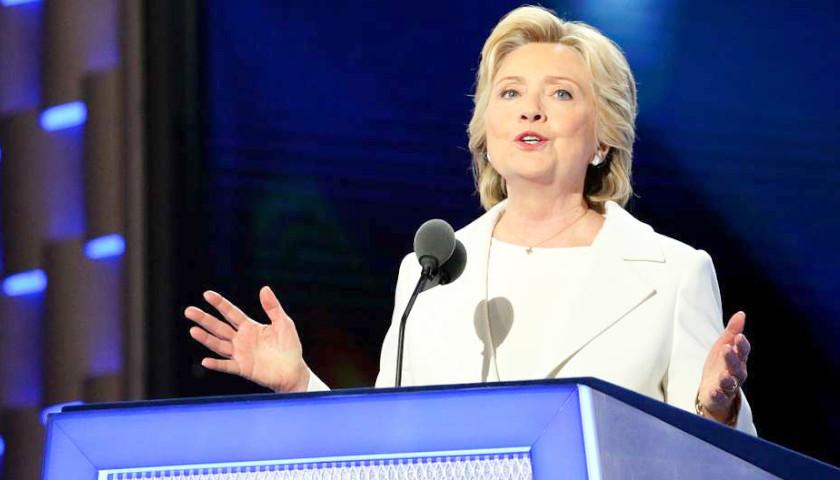by Steven Richards
Hillary Clinton’s New York-based presidential campaign was hit with an administrative fine by the Federal Election Commission following the 2016 election when the FEC found the campaign misrepresented campaign expenses by describing the opposition research that produced the discredited Steele Dossier as a “legal expense.” The Clinton campaign and the Democratic National Committee paid $113,000 to settle the charges, the Associated Press reported.
Yet, Donald Trump faces felony charges for allegedly falsifying business records to conceal campaign violations in the same state, echoing the alleged violations in the Clinton case and indicating a double standard in how the violations were handled by investigators.
Legal experts have criticized Manhattan District Attorney Alvin Bragg’s effort to upgrade what are ordinarily misdemeanor charges to felonies for an undefined federal election crime in order to charge Trump.
“This is a Frankenstein case. They took a dead misdemeanor. They attached it to a dead alleged federal felony and zapped it back into life. So many of us are just amazed to watch this actually walk into court, because it’s not a recognizable crime that any of us have seen. This does not appear to be a federal crime, but that’s the theory that Bragg is using,” legal analyst and George Washington University School of Law professor and self-professed Democrat Jonathan Turley told Fox News.
“This state misdemeanor died because of the statute of limitations. Then what Bragg said was, well, I’m going to allege that you did false filings on business records to hide a crime, but he was very ambiguous [on] what that crime might be. He still is ambiguous, but it is assumed to be a federal election crime,” he added.
Former President Trump was charged by the Manhattan D.A. “for falsifying New York business records in order to conceal damaging information and unlawful activity from American voters before and after the 2016 election,” according to the press release published alongside the indictment.
After the former president allegedly orchestrated a scheme to “catch and kill” negative stories about him in the press, Bragg claims Trump “went to great lengths to hide this conduct, causing dozens of false entries in business records to conceal criminal activity, including attempts to violate state and federal election laws.”
Ordinarily, the statute of limitations on the misdemeanor bookkeeping offense—the falsification of business records—expires after two years. To extend the limitation and charge the former President, Bragg alleged that the entries were created to cover up for another crime, making them felonies. Though Bragg never formally defined the other crime, his case suggests he wants to convince a jury that Trump committed a federal election crime.
However, an FEC investigation did not result in any charges. The “hush money” payments by former Trump lawyer Michael Cohen to accuser Stormy Daniels were investigated by the FEC for potential campaign finance violations.
Though the full FEC commission had dismissed the allegations along party lines, the Democratic representatives wrote that the Commission’s Office of the General Counsel had “recommended finding reason to believe that Cohen and the Trump Organization made, and Trump and Donald J. Trump for President, Inc. (the “Committee”) accepted and failed to report, illegal contributions.”
The Clinton campaign also ran into a similar issue with the FEC after it misrepresented expenditures in election spending reports designated for opposition research. “An investigation was conducted, and the Commission found probable cause to believe that Hillary for America” and the campaign treasurer violated federal codes “by misreporting the purpose of certain disbursements,” according to the conciliation agreement released by the FEC.
As part of the agreement, the Clinton campaign did not admit to any wrongdoing and insisted that the entries were made in the belief the campaign was complying with the law.
“We settled aging and silly complaints from the 2016 election about ‘purpose descriptions’ in our F.E.C. report,” a DNC spokesperson told the New York Times when the agreement was released in 2022.
The payments in question were sent to powerhouse law firm Perkins Coie to pay for the opposition research that ultimately produced the discredited Steele Dossier which sparked the Russian collusion investigation into Donald Trump and his 2016 campaign. Instead of classifying them as for opposition research, the Clinton campaign labeled the expenses “legal services” and “legal and compliance consulting.”
Records from OpenCorporates and the New York Department of State show the Clinton campaign—called HFACC, Inc. or Hillary for America—was registered in 2015 in the state of New York and operates out of an office in the Financial District, which is in Alvin Bragg’s district, theoretically making the campaign subject to the same state laws as Donald Trump.
According to one legal analysis, several New York politicians have been convicted in the past for falsifying business records in furtherance of another crime, including for covert benefits to a campaign as charged in the Trump case. Clinton or her campaign, though, never faced any investigations at the state level related to the the Steele Dossier payments.
– – –
Steven Richard joined Just the News in August 2023 after previously working as a Research Analyst for the Government Accountability Institute (GAI) in Tallahassee, Florida. He is a two-time graduate of Florida State University with a Masters in Political Science and a B.S. in International Affairs.





